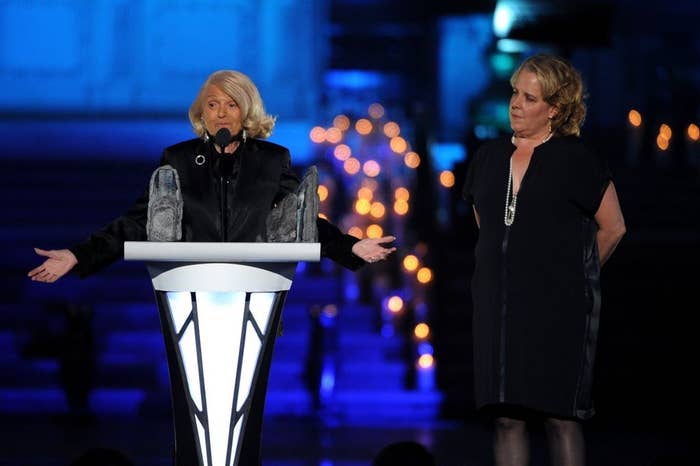
WASHINGTON — One year ago Thursday, the U.S. Supreme Court ended the Defense of Marriage Act's ban on recognizing same-sex couples' marriages. It also dismissed the appeal by supporters of California's Proposition 8 marriage amendment, allowing a trial court ruling striking down that marriage ban to stand.
The year since the Supreme Court's decisions in those cases has been one of near-constant and unbroken advancements for supporters of marriage equality — up to and including two federal court rulings on Wednesday.
Justice Anthony Kennedy's decision striking down section 3 of DOMA in United States v. Windsor has been used by federal appeals judges in the 10th Circuit Court of Appeals — as well as by federal district court judges in Idaho, Illinois, Indiana, Kentucky, Michigan, Ohio, Oklahoma, Oregon, Pennsylvania, Tennessee, Texas, Utah, Virginia, and Wisconsin — to strike down marriage bans and/or bans on recognizing same-sex couples' marriages entered into elsewhere. The decision also played into similar state court decisions in Arkansas, New Jersey, and New Mexico.
Windsor also formed a large part of the basis for a broad decision in the 9th Circuit Court of Appeals to examine any sexual orientation-based government classifications with heightened scrutiny.
Although it's been a whirlwind year, four moments in the first month after those decisions showed quite clearly the path that the country would be traveling.
1. June 28, 2013: Office of Personnel Management announces it is providing federal benefits to married same-sex couples using a "place of celebration" rule, allowing more couples to be covered.
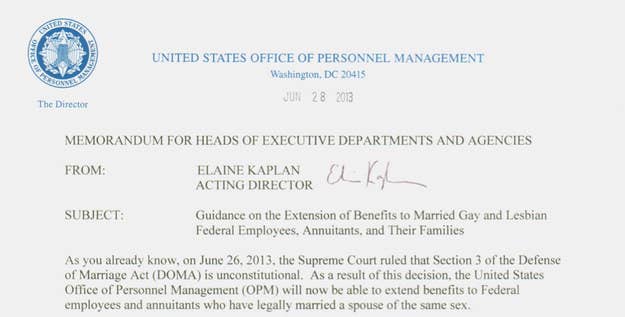
LGBT advocates hoped the administration would use a "place of celebration" rule for recognizing same-sex couples' marriages under federal law — meaning if a marriage was legal in the place it happened, it would be recognized by the federal government anywhere. The other option for the rule, called "place of domicile," would have limited federal recognition to couples in those states with marriage equality.
The quick OPM decision, however, set the stage for a broad government policy of using the "place of celebration" rule to guide federal policy wherever possible. This past week, the Justice Department finished its post-Windsor review, announcing that most agencies are fully implementing marriage recognition policies and determining that only two agencies — the Veterans Affairs Department and Social Security Administration — would require legislative changes in order to allow for "place of celebration" recognition.
2. June 28, 2013: Federal appeals court ends the stay of the trial court order striking down California's Proposition 8, allowing same-sex couples to marry in California.
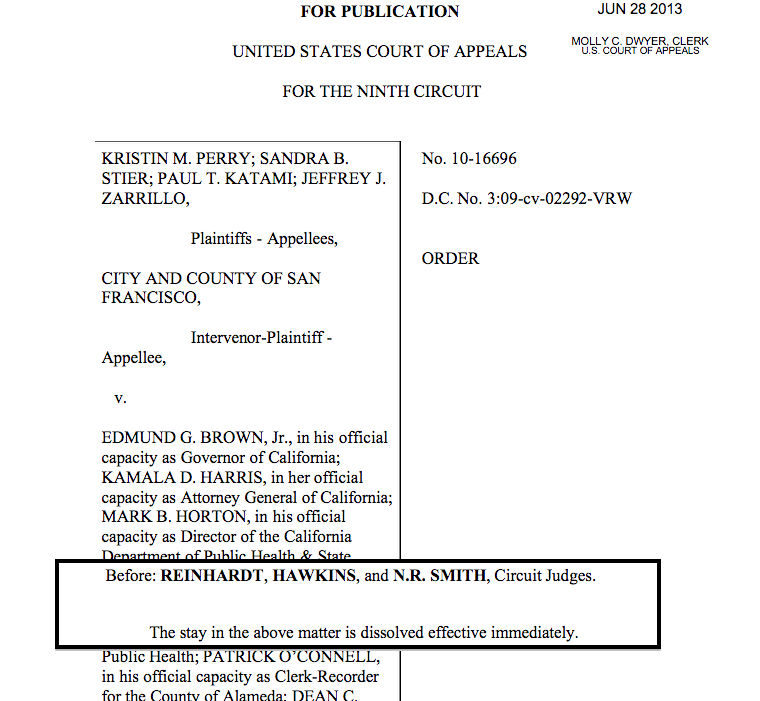
After the Supreme Court dismissed the appeal by supporters of Prop 8, most people expected the process to take weeks before same-sex couples would be allowed to marry again in California.
But that Friday, the 9th Circuit Court of Appeals took action. The court dissolved the stay, or hold, it had put on a lower court's order while waiting for the outcome of the Supreme Court appeal. This allowed marriages to resume two days after the Supreme Court ruling.
The spirit animating the 9th Circuit's decision — that courts are no longer afraid of what happens if their orders allow for same-sex couples to marry — was taken to a new level in December 2013, when U.S. District Court Judge Robert Shelby refused to issue a stay of his ruling striking down Utah's marriage ban — allowing same-sex couples to marry in Utah legally for the first time. Although the ruling eventually was stayed by the Supreme Court, Shelby's refusal to issue a stay — which initially was upheld by the 10th Circuit Court of Appeals — signaled a strong change in judges' presumptions about the impact of allowing same-sex marriages to proceed while appeals are continuing.
3. July 22, 2013: Federal judge issues a temporary restraining order, telling Ohio officials they must recognize a same-sex couple's out-of-state marriage.
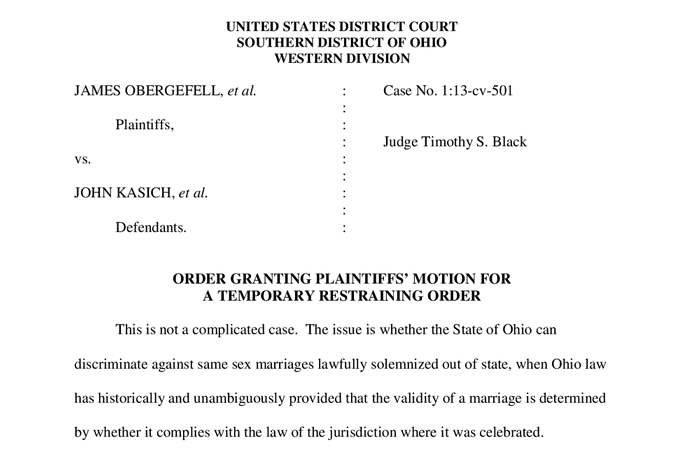
Although the December decision in Utah is generally seen as the first federal court decision on marriage after Windsor, there was another ruling that signaled the direction federal courts would be taking in the coming months.
In July, U.S. District Court Judge Timothy Black issued a temporary restraining order that required Ohio officials to recognize James Obergefell and John Arthur's marriage — which was granted in Maryland — on Arthur's death certificate should he die. Arthur had been suffering from amyotrophic lateral sclerosis (ALS) at the time and died on Oct. 22, 2013. In reaching his decision, Black began his July 2013 order by writing, "This is not a complicated case." His view, thus far, has been proven out by the decision of every federal court — up to and including Wednesday's appeals court decision out of Denver — that has ruled on marriage or marriage recognition cases since.
4. July 18, 2013: House Republicans give up defending statutes similar to section 3 of DOMA.
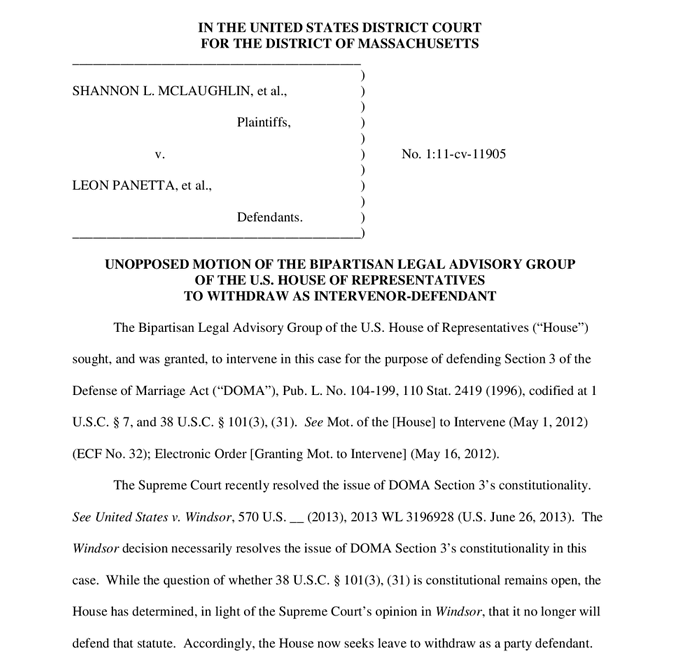
It was not immediately clear after last June's marriage decisions what path the Republican Party would take on marriage issues moving forward. As prominent donors like Paul Singer continued to offer financial support for Republicans willing to buck the party on the issue, the far more common position became one of indifference — or silence.
When it came to a law similar to DOMA that is in the law governing veterans' affairs, House Republicans had been defending the law's constitutionality similar to the way that they had been defending DOMA. In the month after the Supreme Court's Windsor ruling, however, the House Republicans withdrew from defense of that statute. Over the course of the past year, several Republican elected officials — most notably, Pennsylvania Gov. Tom Corbett — have concurred, deciding that fight just isn't worth it. Others, like Wisconsin Gov. Scott Walker, have distanced themselves from the debate altogether — saying they aren't focused on the issue.
